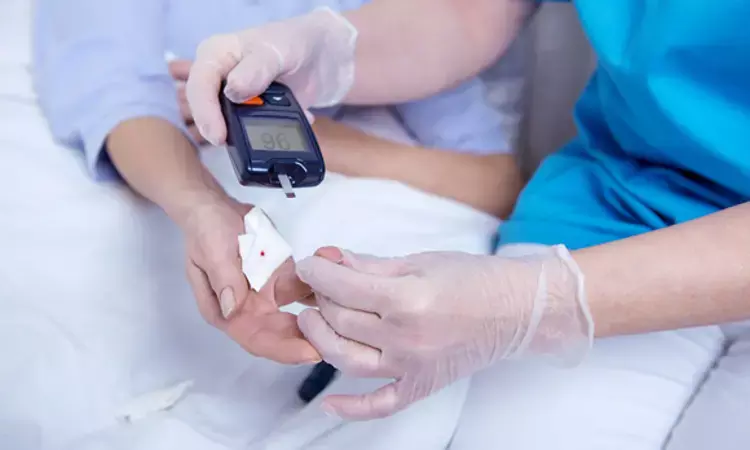- Home
- Medical news & Guidelines
- Anesthesiology
- Cardiology and CTVS
- Critical Care
- Dentistry
- Dermatology
- Diabetes and Endocrinology
- ENT
- Gastroenterology
- Medicine
- Nephrology
- Neurology
- Obstretics-Gynaecology
- Oncology
- Ophthalmology
- Orthopaedics
- Pediatrics-Neonatology
- Psychiatry
- Pulmonology
- Radiology
- Surgery
- Urology
- Laboratory Medicine
- Diet
- Nursing
- Paramedical
- Physiotherapy
- Health news
- Fact Check
- Bone Health Fact Check
- Brain Health Fact Check
- Cancer Related Fact Check
- Child Care Fact Check
- Dental and oral health fact check
- Diabetes and metabolic health fact check
- Diet and Nutrition Fact Check
- Eye and ENT Care Fact Check
- Fitness fact check
- Gut health fact check
- Heart health fact check
- Kidney health fact check
- Medical education fact check
- Men's health fact check
- Respiratory fact check
- Skin and hair care fact check
- Vaccine and Immunization fact check
- Women's health fact check
- AYUSH
- State News
- Andaman and Nicobar Islands
- Andhra Pradesh
- Arunachal Pradesh
- Assam
- Bihar
- Chandigarh
- Chattisgarh
- Dadra and Nagar Haveli
- Daman and Diu
- Delhi
- Goa
- Gujarat
- Haryana
- Himachal Pradesh
- Jammu & Kashmir
- Jharkhand
- Karnataka
- Kerala
- Ladakh
- Lakshadweep
- Madhya Pradesh
- Maharashtra
- Manipur
- Meghalaya
- Mizoram
- Nagaland
- Odisha
- Puducherry
- Punjab
- Rajasthan
- Sikkim
- Tamil Nadu
- Telangana
- Tripura
- Uttar Pradesh
- Uttrakhand
- West Bengal
- Medical Education
- Industry
Low testosterone levels linked to type 2 diabetes in men: Study

J&K, India: Among males, diabetes causes low testosterone levels, and lower levels of testosterone can act as a marker for diabetes, according to a recent study in the Archives of Endocrinology and Metabolism. The findings indicate that with timely intervention diabetes-associated mortality and co-morbidity can be prevented.
Mohammad Hayat Bhat, Department of Medicine, Government Medical College Srinagar, Jammu and Kashmir, India, and colleagues aimed to study the association between testosterone and diabetes in Kashmiri males.
The study included a total of 300 males with Type 2 diabetes who visited an outpatient and inpatient clinic at Shri Maharaja Hari Singh (SMHS) hospital, Srinagar, J&K India. The researchers measured blood sugar and HbA1c, which are the markers of diabetes, and sérum testosterone levels. The blood samples from both the cases and controls were collected.
Key findings of the study include:
· Out of 300 subjects, 42% had a testosterone deficiency.
· A relationship between type 2 diabetic males and healthy males was observed, and testosterone levels were determined to be significantly lower among diabetic males when compared to healthy males.
· On comparing diabetic markers among testosterone deficient and normal testosterone level groups; the mean fasting plasma glucose and glycated haemoglobin (HbA1c) levels were significantly higher in the testosterone deficient group than in the control group.
· To elucidate the relationship between the serum total testosterone level and fasting plasma glucose and HbA1c values, Pearson's correlation test was performed. Fasting plasma glucose levels (r = −0.252) and HbA1c values (r = −0.697) showed a significant negative correlation with serum testosterone levels among diabetic males.
"This study shows that diabetes causes low testosterone levels among males, and lower testosterone levels can act as a marker for diabetes," wrote the authors. "Thus, with timely intervention, mortality and comorbidity associated with diabetes can be prevented."
Reference:
The study titled, "Association between T2DM and the lowering of testosterone levels among Kashmiri males," is published in the Archives of Endocrinology and Metabolism.
DOI: https://www.scielo.br/j/aem/a/cgmMM5Gx479g8qMhWstVMJQ
Dr Kamal Kant Kohli-MBBS, DTCD- a chest specialist with more than 30 years of practice and a flair for writing clinical articles, Dr Kamal Kant Kohli joined Medical Dialogues as a Chief Editor of Medical News. Besides writing articles, as an editor, he proofreads and verifies all the medical content published on Medical Dialogues including those coming from journals, studies,medical conferences,guidelines etc. Email: drkohli@medicaldialogues.in. Contact no. 011-43720751


